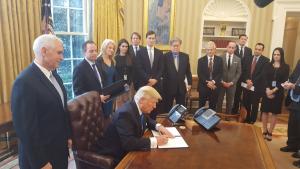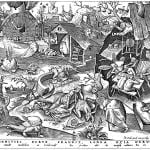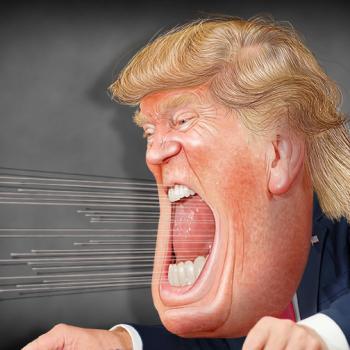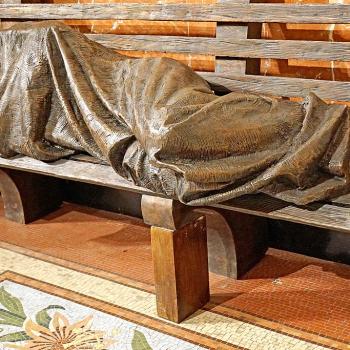
Religious liberty is important. We are to be given the freedom to worship, or not worship, God (or a multitude of gods) as we please, without any external force imposing upon us a limit to our worship. This means that the state should not impose an undue burden upon us and try to suggest a particular form of worship as acceptable, regulating and denigrating other forms of worship. There is, of course, a limit: society has the right and duty to protect itself from evil, corrupt ideologies which would harm people under the guise of religion. The state can and must step in if a particular religion promotes human sacrifice and turns deadly, violating the common good. It is not a violation of religious liberty to restrict such evils, for it is a violation of the principles of religion itself to promote such evils.
Likewise, free speech is important. We should have the freedom to speak our mind without any governmental imposition upon us. The government should not enforce a particular ideology, a particular form of speech. Nonetheless, as with religious liberty, so we find there must be limits to what can be said. Various forms of life (such as slander and libel), inciting violence, or other crimes not only can be silenced, but when the common good is threatened by them, must be silenced. This is not in violation of free speech, but rather, it is the foundation by which such speech can exist. Willful deception breaks down communication, which is what speech entails, even as promotion of violence is about silencing the basic rights of others. Toleration is important, but support of intolerance cannot be had in the name of toleration, and support of words which act contrary to the meaning and intention of speech cannot be had in the name of free speech.
Moreover, religious liberty does not mean that a particular worshiper can enter the worship space of another and violate it as a part of their freedom, even as free speech does not mean anyone can just go anywhere they want and speak freely, even if they enter the space of another. For free speech to exist, it must exist within its proper bounds. Government should not impose upon others the acceptance of a particular form of speech so long as those bounds are met. This is why government must not tell universities that they should open themselves up to speech which runs contrary to the rules and dictates of academia, letting anyone unqualified to speak at whatever function they want to speak at, nor allowing those who might have some qualification to speak in ways which run contrary to the common good (of the university, and of society as a whole). Government must not interfere with academia so long as the common good is preserved; it must not force acceptance of the unacceptable under the name of “free speech”: flat earthers, anti-evolutionists, racist demagogues, those promoting torture or extreme violence, and other such ideologies are unacceptable in a university setting and universities must not be told to accept such speech. To do so is to act contrary to the dictates of free speech itself, for it then demonstrates governmental imposition on what is or is not being said, and it is using its power, moreover, to inflict upon society ideologies which run contrary to society as a whole.
This is why those who are promoting the message that universities are somehow limiting free speech due to “political correctness,” are using the term “free speech” in a way which runs contrary to its meaning in a way to promote the destruction of free speech. While Donald Trump’s executive order concerning “free speech,” might not, on paper, reflect a major change, the ideological intention behind it is to impose upon universities the need to promote speech which runs contrary to the nature of the university itself, and in doing so, run contrary to the whole point of free speech itself. For what Trump and his allies want is for universities to welcome a particular ideology which had otherwise been long banished from the academic scene. When the government demands a particular speech being granted a voice at a private institution, liberty is itself threatened. Therefore, it should not be surprising that the same people who think they are being unjustly silenced at universities, because of the dangerous falsehoods they promote, are often the very ones who seek to limit and silence those who exercise true academic freedom at universities by making lists of those figures they think should be silenced. How many of them speak up for professors who are demoted or lose their jobs because they said something challenging to them? How many of them, instead, gloat at the harm being done to academic freedom and true free speech?
Freedom of speech is an important liberty. But like all liberties, some can try to take it up and turn it inside-out and upside-down, so that what comes out is not freedom of speech but the imposition of a particular loathsome ideology by the government. When academic freedom, and free speech, is truly infringed upon by universities, there can be and should be a remedy; but we must not fool ourselves in thinking this is what Donald Trump and his allies want. They do not want free speech at college campuses. They want, rather, to use their supposed promotion of free speech as a trojan horse to promote, with government authority, ideologies which have long been rejected because of the danger they bring to a free society. Demanding universities to allow anyone who wants to speak undermines not only what a university is about (and so an undermining of education), it undermines the whole point of free speech itself.
Stay in touch! Like A Little Bit of Nothing on Facebook













